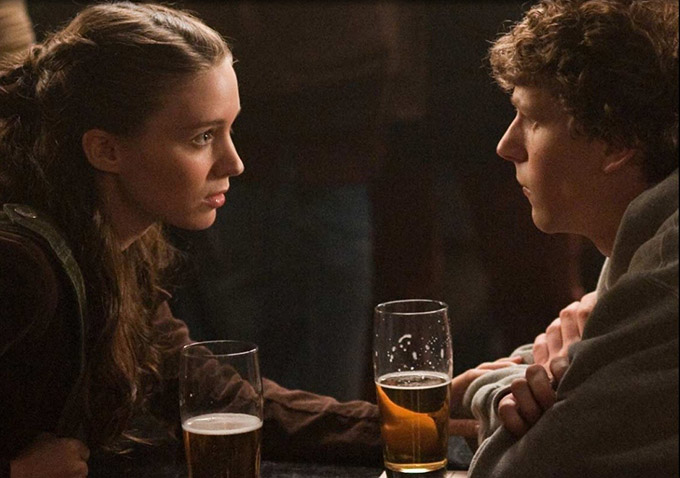The opening scene of "The Social Network" is an unlikely one. Where most screenwriters would start their tale about the founder of Facebook with Mark Zuckerberg coding or frustratingly sending his friends an Evite over ICQ (or something), Aaron Sorkin opts for a breakup. It’s a terrific, witty, barbed, and very word heavy scene that tells us everything we need to know about the prickly personality of our protagonist in a few minutes. And it can be easy to forget what a feat of writing and directing the sequence is.
Chatting with THR as part of their interview series at Loyola Marymount University’s School of Film & TV, Sorkin shared his experience of working with producer Scott Rudin and director David Fincher — two of the toughest, most creatively driven guys in the business — on the movie. And he breaks down the impressive way that Fincher not only fought Sony to keep Sorkin’s dense script intact, but also save on the budget too. It’s a lengthy anecdote, but well worth the read:
David Fincher and Scott Rudin are very, very good at what they do. I believe that Scott Rudin is the best producer of plays and movies alive. I think he gives a lot of the dead producers a run for their money. But he is a demanding person, an exacting person. He may not speak to you the way you’d like to be spoken to. He’s a tough, tough man. So is David. David is a truly phenomenal artist, with no affect, no pretention at all, but with a great eye, and uncompromising.
At the beginning of the process of making a movie, the first battle you’re going to have is over the budget, right? The director is going to sit down with, it’s called a line producer, and they’re going to figure out as close as they can what the budget of the movie is going to be, by going through scene by scene, I’m going to need 100 extras here, I’m going to need a helicopter there, I need this kind of camera for this, this I don’t-you know, I want to shoot on the exact location. I don’t want to shoot in Pasadena, pretending it’s this place, that kind of thing. And they’ll come up with a budget for the movie, and the studio is doing the exact same thing with their in-house line producer. Those two numbers are going to be far apart, and there is a negotiation to find your way in the middle, unless you’re David Fincher, OK, who comes in and says $41 million. And the studio will say $30 million, and he’ll say, no, $41 million, and the studio is, like, $35 million. And he said listen, you think I’m negotiating with you. I’m telling you, the price of this movie is $41 million. That’s what it costs to make this movie. I don’t want to make the $40.5 million version of the movie. Now, some people might think you’re being a jerk. Find your way, figure out a way to make the movie you want to make for what’s somewhere in the middle. I don’t think that David is being a jerk.
I absolutely loved working with him. An average screenplay is about 120 pages long. My screenplays have higher page counts because there’s more dialogue and less action and just, by the rules of screenplay format, dialogue takes up more room on the page and less time on the screen than action, which takes up more room on the page — I’m sorry, which takes up less room on the page and more time on the screen. So the average screenplay is about 120 pages. A Few Good Men was about 140 pages. The Social Network was 178 pages, and the studio said, OK, the first thing you’ve got to do is figure out a way to cut 30 pages from this. And David said, I don’t think so. I think this is a two hour movie, and he came over to my house with his iPhone set on stopwatch mode, and he said, "I want you to read the entire script out loud for me, at the pace you heard it in your head when you were writing it, and I’m going to write down the timing of each scene." So that opening scene that you’ve been very complimentary about, with Jesse Eisenberg and Rooney Mara. If I read it and it was seven minutes and 22 seconds, then in rehearsal, and David demanded part of what was baked into the budget was rehearsal time, and part of what wasn’t baked into the budget, I remember David saying to them, "Well, I can cut $125,000 out of your budget right away, because we’re not doing any test screenings." That’s the kind of thing. And I just thought David, Scott, these are the bullies I want to be with. You know, they’re great when they’re on your team. And anyway, in rehearsal, Jesse and Rooney would rehearse the scene, David would say great, and he would give them a couple of notes, and always end with, "But this scene is seven minutes and 22 seconds long, and you’re doing it at seven minutes and 40 seconds. So I don’t care how, but you’re going to have to talk faster somewhere, because I promise you, this scene plays best at seven minutes and 22 seconds."
Thats a pretty great tastes of what the process was like behind-the-scenes with Fincher and co. as they pulled "The Social Network" together, and below, you can see the result of their efforts.

